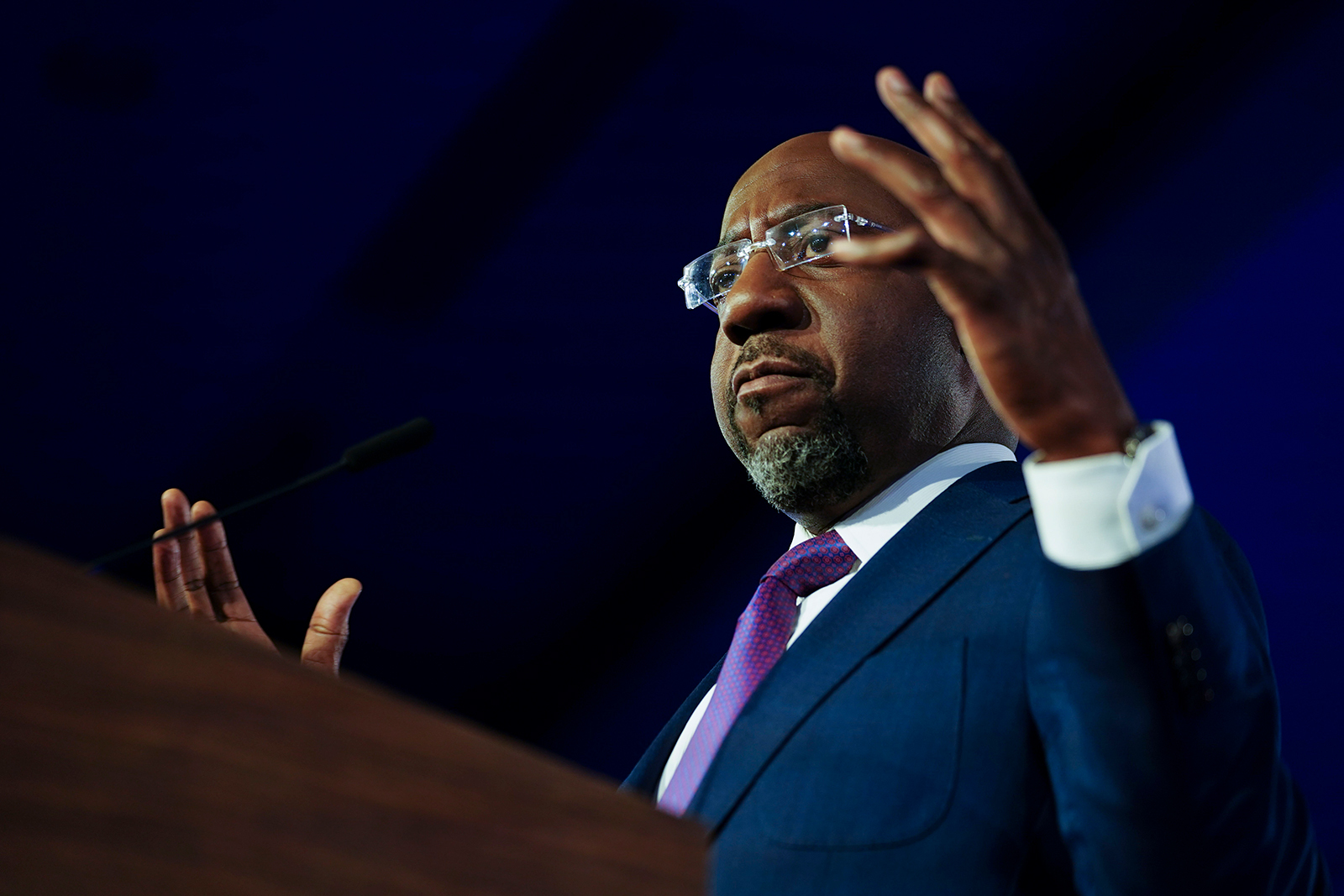Our live coverage has moved. You can follow live updates on Wednesday here.
Democratic Sen. Raphael Warnock will win Georgia Senate runoff
By Elise Hammond, Maureen Chowdhury, Adrienne Vogt, Aditi Sangal, Melissa Macaya, Seán Federico-O'Murchú and Meg Wagner, CNN
Key takeaways from Georgia’s Senate runoff
From CNN's Gregory Krieg and Eric Bradner

Sen. Raphael Warnock remains undefeated. After being pushed to another runoff in November, the Democrat asked voters in Georgia to put him over the top “one more time” in December – and, once again, they delivered.
Since November 2020, Warnock has been the leading vote-getter in four consecutive Georgia Senate elections. But because of state law requiring statewide candidates to get a majority to win a general election, Warnock had to double the feat in both his 2020 special election and his 2022 bid for a full six-year term.
His victory in this head-to-head contest with Republican nominee Herschel Walker means Democrats will add to their already-secured Senate majority, with 51 seats to the GOP’s 49, and solidify the Peach State as a potentially decisive 2024 presidential battleground.
As the 2022 midterm cycle spins to its end, here are key takeaways from this final election night in Georgia:
51st seat gives Democrats true majority: Democrats had already clinched control of the Senate, with 50 seats secured last month, which would allow Vice President Kamala Harris to cast the tie-breaking vote as she does now. But winning a 51st seat, thanks to Warnock’s victory Tuesday, comes with important benefits for the Democrats running the Senate and for President Joe Biden’s administration.
The party will now enter 2023 with a true Senate majority – one that won’t require the power-sharing agreement that has been in place over the last two years in an evenly divided chamber. That outright majority means that Democrats will have the majority on committees, allowing them to advance Biden’s nominees more easily.
Georgia is a swing state until further notice: As long as former President Donald Trump remains an influential figure in Republican politics, Georgia is poised to be a crucial Election Day battleground – especially when federal offices are on the ballot.
If there was any doubt before Tuesday, it’s been erased now. Walker was Trump’s hand-picked candidate to take on Warnock and he flamed out despite first running on a ticket with a popular Republican governor and then, this time, with that same governor’s express endorsement and support on the campaign trail.
Kemp’s inability to pull Walker over the finish line says less about him – or even Walker, a flawed candidate in any setting – than the state’s shifting partisan alignment. Changing demographics, an evolving economy and strategic, tenacious organizing by Democrats have made a beacon of the Old South a legitimate swing state.
On now to 2024.
The Democratic turnout machine strikes again: After the 2020 election, Georgia Republicans passed a controversial law that, among other things, reduced the amount of time between a November election and potential runoff, creating a condensed timeline that narrowed the window for mail-in voters and reduced the number of days to vote early in-person.
It didn’t matter.
The Democratic turnout machine in Georgia over the past four weeks – with a running start that goes back years and owes heavily to the groundwork by Stacey Abrams and her allies – once again delivered in a hotly contested race that attracted tens of millions of dollars in spending by the campaigns and national organizations.
Read more takeaways here.
In pictures: Warnock celebrates runoff win
From CNN Digital's Photo Team

Democratic Sen. Raphael Warnock thanked a boisterous crowd of supporters at his election night party in Atlanta on Tuesday.
"Thank you from the bottom of my heart and to God be the glory for the great things that God has done. And after a hard-fought campaign — or should I say campaigns — it is my honor to utter the most four most powerful words in a democracy: The people have spoken," he said.
Here are some of the scenes after Warnock was projected as the winner of Georgia's Senate runoff race:





Democrats have now secured a slim 51-49 majority over Republicans in the Senate. Here's what that means
From CNN's Ali Zaslav and Ted Barrett

Democratic Sen. Raphael Warnock will win Georgia’s Senate runoff, CNN projects, allowing Democrats to secure a slim 51-49 majority over Republicans in the chamber.
Democrats will have significant governing advantages compared to the 50-50 split in the current Congress, during which a power-sharing agreement gives Republicans considerable leverage over Democrats despite being in the minority.
- Democrats will hold majorities in each committee, allowing them to process legislation and nominations much faster. Democrats will also enjoy bigger staffs and budgets, giving them more ability to carry out committee work. Committees are currently evenly split – as are the resources – allowing Republicans to slow the pace of nominees they oppose. When a choice deadlocks in committee, Democrats must take time-consuming steps to discharge that person from committee and allow a floor vote. In one instance earlier this year, Republicans used Banking Committee rules to prevent a vote from even taking place by boycotting committee sessions, ultimately forcing President Joe Biden to withdraw a nominee for the Federal Reserve. Tuesday’s result will also free up additional floor time for Senate Majority Leader Chuck Schumer to use toward other nominees and Democratic priorities.
- Democrats will have stronger power to issue subpoenas. They will no longer need bipartisan support to issue subpoenas so they can bypass GOP opposition to using these key tools. This could increase the power and number of Democratic-led investigations.
- Centrist Democrats may not hold as much power over Democrats’ agenda. A two-seat majority margin gives Schumer more breathing room to pass legislation without needing support from all members of his caucus – like West Virginia Sen. Joe Manchin and Arizona Sen. Kyrsten Sinema, moderates who will both be up for reelection in 2024. The two held enormous power in the 50-50 Senate.
- Filling a Supreme Court vacancy could be easier. The two-seat margin could also become critical if there were to be a Supreme Court vacancy as only a majority is needed to confirm a justice to that post, allowing Schumer to lose one vote.
- Harris might not be needed as often on the Hill. Democrats likely won’t have to rely as heavily on Vice President Kamala Harris to break tie votes on nominations and legislation, something she’s done 26 times so far in the current 50-50 Senate, the most by any vice president in modern times.
For the first time in a century, every Senate incumbent won
Analysis from CNN’s Harry Enten

One of the most common refrains in politics is that voters hate Washington and want outsiders to be elected to office. Democratic Sen. Raphael Warnock’s victory in Georgia’s Senate runoff is part of a trend that suggests that, at least in 2022, that wasn’t true.
Each of the 29 Senate incumbents who ran for reelection this year won. It is the first time in at least a century in which no incumbent senator seeking reelection lost.
So what happened?
I’ll have more on this on Wednesday morning, but to put it simply:
- Bad challenger quality.
- A map without a lot of competitive races taking place in an era of high polarization.
- An unusually tight national environment.
Biden posts photo of congratulatory call to Warnock: "Tonight Georgia voters stood up for our democracy"
From CNN's Phil Mattingly
President Biden placed a congratulatory phone call to Democratic Sen. Raphael Warnock shortly after he returned to the White House Tuesday. The White House just posted a photo of the call on Twitter.
“Tonight Georgia voters stood up for our democracy, rejected Ultra MAGAism, and most importantly: sent a good man back to the Senate. Here’s to six more years,” the post said.
See the photo:
Schumer calls Warnock's runoff win a "victory for Georgia, and a victory for democracy"
Democratic Sen. Raphael Warnock's win in Georgia’s Senate runoff will allow Democrats to secure a slim 51-49 majority over the GOP in the chamber.
Senate Majority Leader Chuck Schumer celebrated Tuesday night with a series of tweets, calling the results a "victory for Georgia, and a victory for democracy."
Warnock cautions that outcome of election does not mean there is no voter suppression in Georgia

Democratic Sen. Raphael Warnock, who is projected to win reelection after a runoff against Republican challenger Herschel Walker, cautioned people against viewing the outcome as evidence that voter suppression doesn't exist in Georgia.
“Let me be clear: Just because people endured long lines that wrapped around buildings, some blocks long, just because they endured the rain and the cold and all kinds of tricks in order to vote, does not mean that voter suppression does not exist. It simply means that you the people have decided that your voices will not be silenced," he said during his victory speech Tuesday.
He pointed to a court decision of the election that allowed counties to offer early voting on the Saturday after Thanksgiving.
State election officials had previously argued that early voting on Nov. 26 was not allowed because it violated state law prohibiting voting on Saturday if there is a state holiday on the Thursday or Friday before.
“But we sued them and we won," Warnock said.
Warnock says he is an iteration of the state's complex history: "I am Georgia"

Democratic Sen. Raphael Warnock drew parallels from Georgia's complex history to his own life and deep roots in the state during his victory speech Tuesday night after CNN projected he won the runoff race.
He noted that his mother grew up in the 1950’s in Waycross, Georgia, “picking somebody else’s cotton and somebody else’s tobacco — but tonight she helped pick her youngest son to be a United State’s senator.”
Warnock went on to say that he watched his late father "a pastor and a small business man, take care of his family by working really hard with his hands."
"I am a proud son of Savannah, Georgia," he told his supporters.
He continued: "A coastal city known for its verdant town squares and cobblestone streets — tall, majestic oak trees. Dripping with Spanish moss. Bend and back in the love of history and horticulture to this city by the sea. My roots, like the roots of those oak tree's go deep down into the soil of Savannah and Waycross and Screven County and Burke County. I am Georgia. I am an example and an iteration of its history. Of its pain and promise, the brutality and the possibility. But because this is America. And because we always have a path to make our country greater against unspeakable odds, here we stand together. Thank you Georgia."
As Warnock becomes the state's first Black senator to win a full term, Vice President Kamala Harris’ historic tie-breaking role in the Senate will likely be less necessary because of the additional vote.
CNN's Jasmine Wright contributed reporting to this post.


